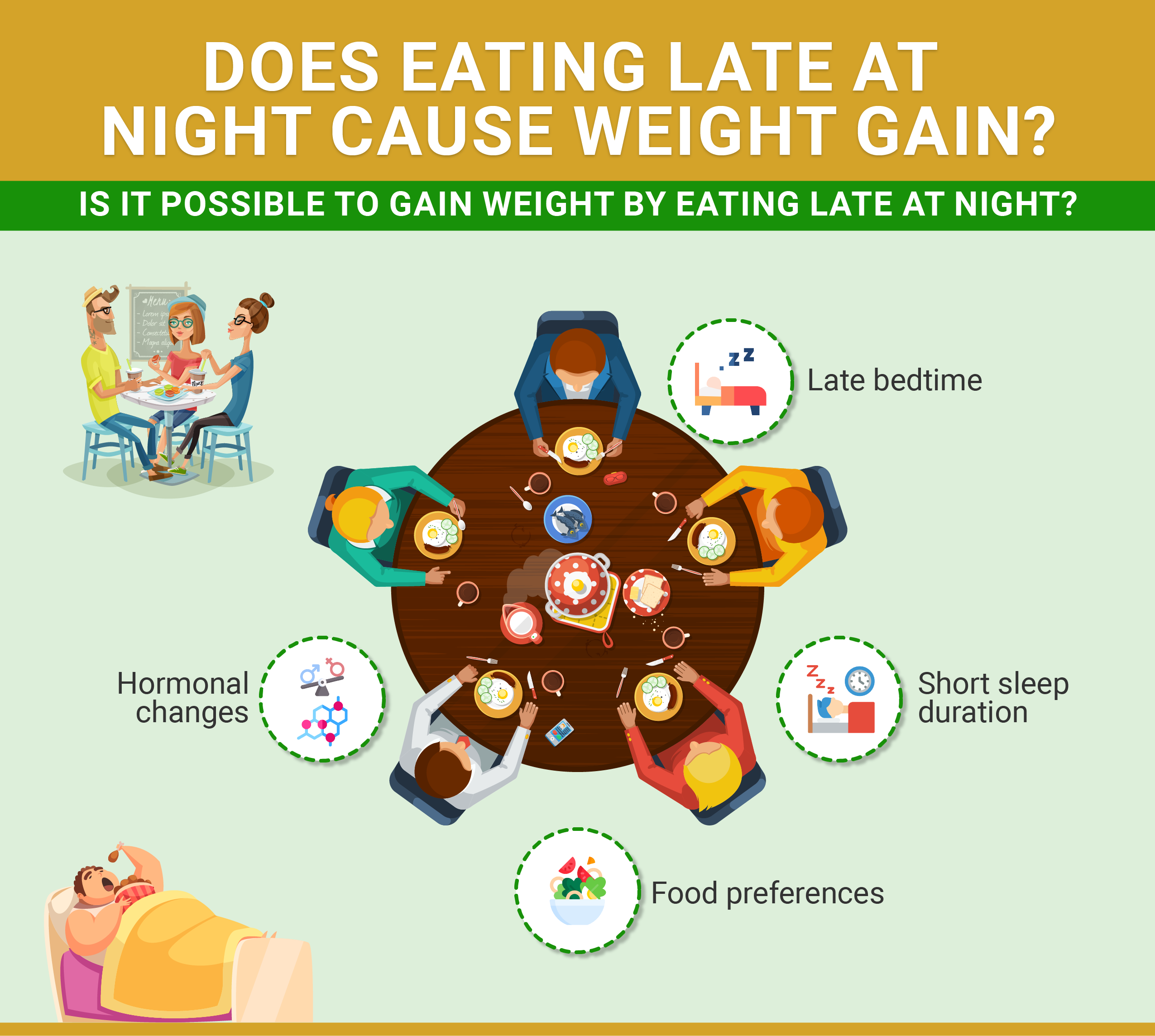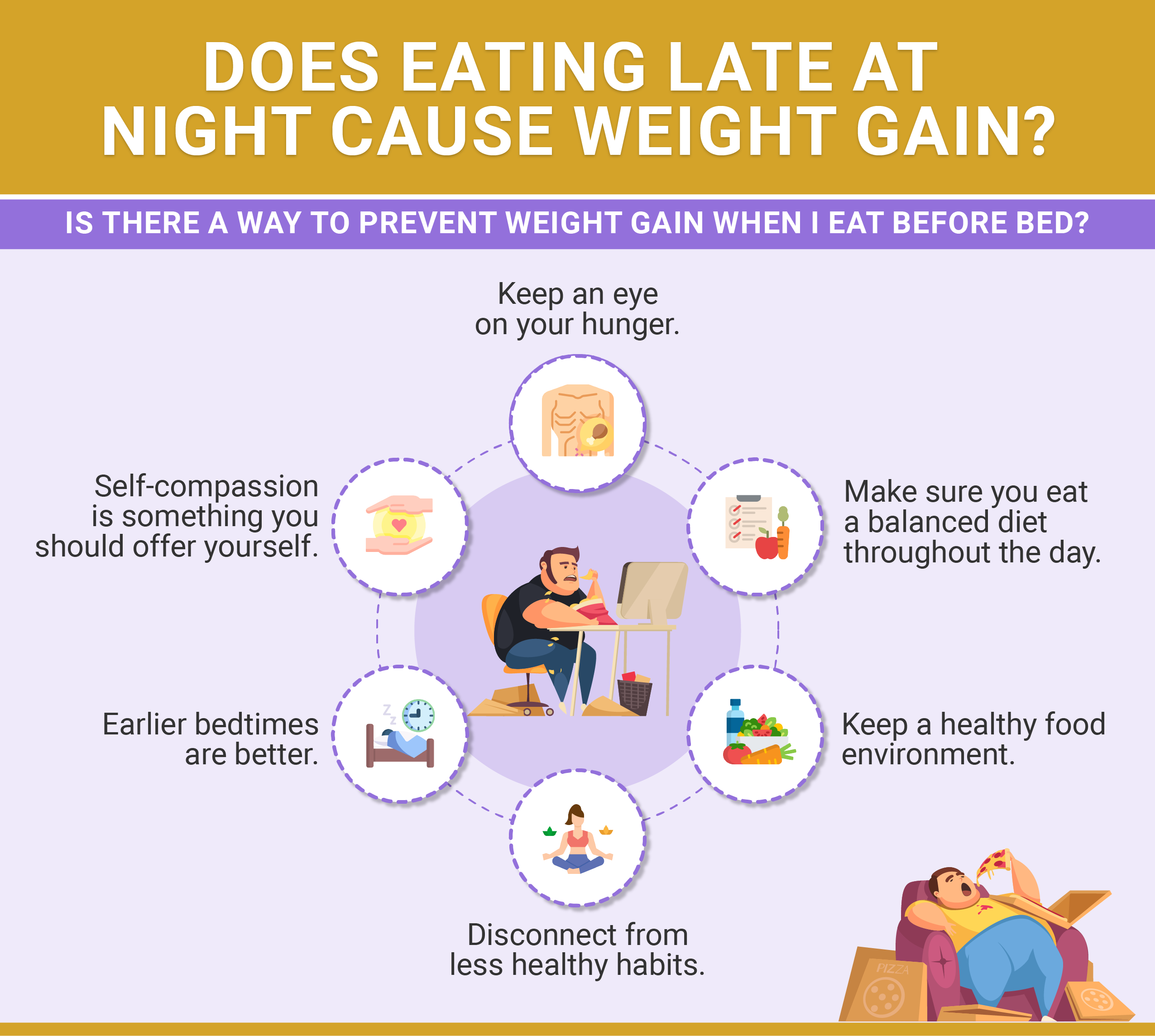Does Eating Late at Night Cause Weight Gain?
It Eating late at night is commonly believed to cause weight gain. Is this myth true or false? If this is true, why does it happen? As we seek to find more ways to help people manage their weight, recent research has examined the relationship between eating time and weight change. To manage your weight and overall health, let's discuss what the research shows.
Is it possible to gain weight by eating late at night?
The research suggests that eating late does result in weight gain, and there may be multiple reasons for this.
- Late bedtime – When you eat late at night, you will likely go to bed late. The results of studies indicate that people who stay up later eat more, about 500 calories on average. Before bed, we consume these calories late at night or in the early hours of the morning. As a result, a late bedtime leads to more calories eaten in a day, which leads to weight gain.
- Short sleep duration – There is a link between a late bedtime and shorter sleep duration, which can increase the hunger hormone ghrelin and decrease the fullness hormone leptin. These changes in appetite hormones can cause increased caloric intake. Sleep deprivation can also cause us to lose energy, making it harder for us to participate in physical activity, which is one of the keys to losing weight.
- Food preferences – Those who sleep for short periods are more likely to prefer carbohydrates and sweets. As a result of sleep deprivation, people tend to seek foods that provide quick energy. As well, eating late at night tends to involve high-calorie snacks. At 11 p.m., carrot sticks aren't as appealing as potato chips, which is not surprising.
- Hormonal changes – It has been shown that eating closer to bedtime affects several hormone signals, including hunger and fullness hormones. This means insulin and blood sugar levels at night and first thing in the morning are higher due to eating closer to bedtime. High insulin levels encourage fat storage and weight gain because insulin tells our bodies to store fat. Additionally, type 2 diabetes risk increases.

Is eating before bed bad for you in any other way?
The effects of eating before bed can also be detrimental to your health. Our biggest meal of the day is dinner; when we eat a big meal and then lie down, we are more likely to get acid reflux. A condition in which stomach contents flow into the oesophagus is called acid reflux (also called gastroesophageal reflux disease or GERD). When GERD is left untreated, it can lead to serious problems such as inflammation, narrowing, and even cancer of the oesophagus.
Blood sugar, cholesterol, and triglycerides are also increased when you eat before bed. Type 2 diabetes and high cholesterol are both associated with an increased risk of heart disease.
Is it possible to lose weight while eating late at night?
There's no doubt that it's possible. Losing weight is more than just determined by eating late at night. Although late-night snacking and short sleep duration contribute to weight gain, some of that effect can be attributed to food choices during late-night snacking. Likely, eating later will not prevent losing weight as long as you are mindful of what you eat, eat a diet low in calories, participate in regular physical activity, and get enough sleep. However, remember that eating right before bed can also have negative effects, so eating more calories earlier in the day is best for your health.
Is there a way to prevent weight gain when I eat before bed?
When it comes to healthy eating, many people find the time between dinner and bed particularly challenging. During this time, you can practice the following strategies for a healthier lifestyle:

- Keep an eye on your hunger. The next time you're in the kitchen after dinner, could you think about why you're there? Is your body physically hungry? Would it be a craving or a habit that caused you to eat? After drinking 16 ounces of water, wait 20 minutes before drinking more. If you are still hungry, try something crunchy, like carrots and hummus.
- Make sure you eat a balanced diet throughout the day. Consider your diet earlier in the day if you are hungry in the evening. You can control your hunger even late by eating regular meals and snacks high in protein, vegetables, and fibre.
- Keep a healthy food environment. The temptation to eat unhealthy snacks can be very strong after a long, exhausting day. Put away tempting foods instead of relying on willpower. When you need a snack, keep more healthful options available in opaque containers out of sight, or keep them in opaque containers out of sight if your family members insist.
- Disconnect from less healthy habits. TV watching and eating go hand in hand for many people in the evening. Put an end to these behaviours by disconnecting them. Spend a few minutes knitting or sipping decaffeinated tea. You can also change your TV habits. It is also good for digestion to take a walk after dinner to avoid evening eating. In addition, it increases your daily physical activity!
- Earlier bedtimes are better. Even though it may be easier said than done, having an earlier bedtime has many benefits. Getting more sleep and eating less in the evening will benefit your health! Set small goals for getting to bed earlier this week if you have always been a night owl - 15 or 30 minutes earlier is all that is needed. Then gradually increase the time until you reach the bedtime you desire. Please ensure you have a phone alarm set to go off as soon as you start getting ready for bed (not when you need to) to remind you when it's time.
- Self-compassion is something you should offer yourself. There can be much difficulty in breaking the habit of eating late at night in the evening, especially after years of practice. Don't be hard on yourself if you manage to avoid it a few times, but it happens again. Take time to celebrate your achievements, and remember that this will be a process. Investigate why some nights were possible and others hard, and then move on. Using all the tools reviewed above, you can try again tomorrow if you like.
How Weightloss Coach Can Help You with your Weight Loss Journey
Weight loss experts at Weight Loss Coach can help you develop skills in incorporating healthy eating and sleep habits into your daily life to reach your weight loss goals. Medical weight loss programs covered by insurance can help you lose weight and build new habits to keep it off. A doctor and registered dietitian work together to create a customised weight loss plan incorporating diet, exercise, mindset shifts, and medications.



Comments